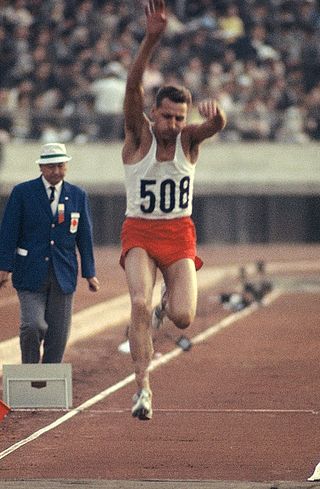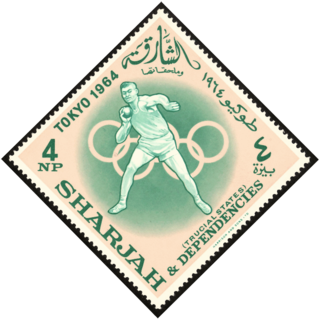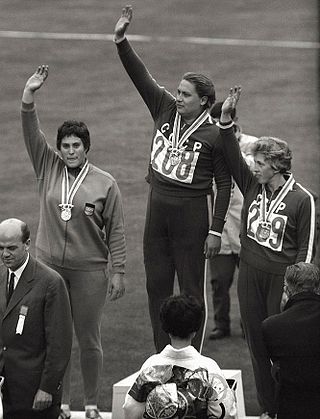
The men's long jump was one of four men's jumping events on the Athletics at the 1964 Summer Olympics program in Tokyo. It was held on 18 October 1964. 37 athletes from 23 nations entered, with 5 not starting in the qualification round. The maximum number of athletes per nation had been set at 3 since the 1930 Olympic Congress. The event was won by 4cm by Lynn Davies of Great Britain, breaking a string of eight straight American victories. It was Great Britain's first gold medal in the men's long jump, and first medal since 1900. It was only the second time the United States had not won the event, with Sweden's William Petersson in 1920 the only non-American to win before Davies. Ralph Boston of the United States and Igor Ter-Ovanesyan of the Soviet Union became the third and fourth men to win a second medal in the long jump.

The men's triple jump was one of four men's jumping events on the Athletics at the 1964 Summer Olympics program in Tokyo. It was held on 16 October 1964. 36 athletes from 23 nations entered, with 2 not starting in the qualification round. The maximum number of athletes per nation had been set at 3 since the 1930 Olympic Congress. The event was won by Józef Szmidt of Poland, the third man to repeat as Olympic champion in the triple jump. Just as in 1960, the Soviet Union took silver and bronze behind Szmidt.

The men's high jump was one of four men's jumping events on the Athletics at the 1964 Summer Olympics program in Tokyo. Qualification was held on October 20, 1964, with the final on October 21. 29 athletes from 20 nations entered, with 1 not starting in the qualification round. The maximum number of athletes per nation had been set at 3 since the 1930 Olympic Congress. The event was won by Valeriy Brumel of the Soviet Union, the nation's second consecutive victory in the men's high jump. Brumel, who had earned silver in 1960, and American John Thomas, who had previously taken bronze in 1960 and now won silver, became the first two men to win multiple medals in the Olympic high jump. John Rambo, also of the United States, won bronze to complete the podium.

The men's shot put was one of four men's throwing events on the Athletics at the 1964 Summer Olympics program in Tokyo. It was held on 17 October 1964. 25 athletes from 15 nations entered, with 3 not starting in the qualification round. The maximum number of athletes per nation had been set at 3 since the 1930 Olympic Congress. The event was won by Dallas Long of the United States, the nation's fifth consecutive and 13th overall victory in the men's shot put. His teammate Randy Matson took silver, making 1964 the fifth straight Games the Americans had finished one-two. A second consecutive sweep was prevented when Vilmos Varju of Hungary took third over American Parry O'Brien. Long was the sixth man to win two shot put medals ; Matson would later become the seventh. O'Brien's fourth place finish kept him from being the first man to win four—he had taken gold in 1952 and 1956 and silver in 1960.

The men's discus throw was one of four men's throwing events on the Athletics at the 1964 Summer Olympics program in Tokyo. It was held on 15 October 1964. 29 athletes from 21 nations entered, with 1 additional athlete not starting in the qualification round. The maximum number of athletes per nation had been set at 3 since the 1930 Olympic Congress. The event was won by Al Oerter of the United States, the nation's fourth consecutive and 11th overall victory in the men's discus throw. Oerter became the first man to win three medals in the event, all of them gold. He was only the second person to win three consecutive gold medals in any individual athletics event. It was the third of his four consecutive wins in the event. Ludvik Danek of Czechoslovakia took silver to break up the Americans' two-Games dominance of the discus podium; no non-American had won a medal since 1952. Dave Weill earned bronze to make this the fourth straight Games that the United States had won at least two medals in the event.

The men's hammer throw was one of four men's throwing events on the Athletics at the 1964 Summer Olympics program in Tokyo. It was held on 17 October and 18 October 1964, with the qualification on the first day and the final the next. 25 athletes from 14 nations entered, with 1 not starting in the qualification round. The maximum number of athletes per nation had been set at 3 since the 1930 Olympic Congress. The event was won by Romuald Klim of the Soviet Union, the nation's second consecutive victory in the men's hammer throw. Gyula Zsivótzky of Hungary repeated as silver medalist, the fifth man to win multiple medals in the event. Uwe Beyer took bronze, the first medal for the United Team of Germany and the first medal for any German hammer thrower since 1952.

The women's shot put was one of three women's throwing events on the Athletics at the 1964 Summer Olympics program in Tokyo. It was held on 20 October 1964. 17 athletes from 12 nations entered, with 1 not starting the qualification round.

The women's discus throw was one of three women's throwing events on the Athletics at the 1964 Summer Olympics program in Tokyo. It was held on 19 October 1964. 22 athletes from 15 nations entered, with 1 not starting in the qualification round.
The Women's Javelin Throw was one of three women's throwing events on the Athletics at the 1964 Summer Olympics program in Tokyo. It was held on 16 October 1964. 16 athletes from 10 nations entered.
The men's discus throw event at the 2000 Summer Olympics as part of the athletics program was held at the Olympic Stadium on Sunday, 24 September and Monday, 25 September. Forty-five athletes from 28 nations competed. The event was won by Virgilijus Alekna of Lithuania, the nation's second victory in the men's discus throw. Lars Riedel of Germany took silver, becoming the 13th man to win multiple discus throw medals. Frantz Kruger earned South Africa's first medal in the event with his bronze.
The Women's javelin throw competition at the 2012 Summer Olympics in London, United Kingdom. The event was held at the Olympic Stadium on 7–9 August. Each athlete receives three throws in the qualifying round. All who achieve the qualifying distance progress to the final. If less than twelve athletes achieve this mark, then the twelve furthest throwing athletes reach the final. Each finalist is allowed three throws in last round, with the top eight athletes after that point being given three further attempts.

The Men's javelin throw competition at the 2012 Summer Olympics in London, United Kingdom. The event was held at the Olympic Stadium on 8–11 August.

The men's shot put competition at the 1968 Summer Olympics in Mexico City, Mexico took place on October 13–14. Nineteen athletes from 14 nations competed. The maximum number of athletes per nation had been set at 3 since the 1930 Olympic Congress. The event was wo by Randy Matson of the United States, the nation's sixth consecutive and 14th overall victory in the men's shot put. His teammate George Woods took silver, making 1968 the sixth straight Games the Americans had finished one-two. Matson was the seventh man to win two medals in the event ; Woods would become the eighth in 1972. Eduard Gushchin took bronze, the Soviet Union's first men's shot put medal.

India competed at the 2020 Summer Olympics in Tokyo, Japan. Originally scheduled to take place in July–August 2020, the games were postponed to 23 July to 8 August 2021, due to the COVID-19 pandemic. The Games marked the nation's 25th appearance at the Summer Olympics after having made its official debut at the 1900 Summer Olympics.

The men's shot put event at the 2020 Summer Olympics took place between 3 and 5 August 2021 at the Japan National Stadium. Thirty-one athletes from 22 nations competed. For the first time in Olympic history, the same three competitors received the same medals in back-to-back editions of an individual event. Americans Ryan Crouser and Joe Kovacs and New Zealander Tom Walsh repeated their gold, silver, and bronze (respectively) performances from the 2016 Summer Olympics. They became the 15th, 16th, and 17th men to earn multiple medals in the shot put; Crouser was the 4th to repeat as champion.

The men's discus throw event at the 2020 Summer Olympics took place between 30 and 31 July 2021 at the Japan National Stadium. Approximately 35 athletes were expected to compete; the exact number depended on how many nations use universality places to enter athletes in addition to the 32 qualifying through distance or ranking. 32 athletes from 24 nations competed. Daniel Ståhl of Sweden won gold, with his countryman Simon Pettersson earning silver. It was the first victory in the event for Sweden and the first men's discus throw medal of any color for the nation since 1972. Lukas Weißhaidinger took Austria's first-ever Olympic in the men's discus with his bronze.

The men's hammer throw event at the 2020 Summer Olympics took place between 2 and 4 August 2021 at the Japan National Stadium. Approximately 35 athletes were expected to compete; the exact number was dependent on how many nations used universality places to enter athletes in addition to the 32 qualifying through distance or ranking. 31 athletes from 21 nations competed. Wojciech Nowicki of Poland won the gold medal, adding to his 2016 bronze to become the 15th man to earn multiple hammer throw medals. It was Poland's second gold medal in the event, after Szymon Ziółkowski's 2000 victory. Nowicki's countryman Paweł Fajdek took bronze. Between them was Norwegian thrower Eivind Henriksen, with his silver being Norway's first-ever Olympic medal in the men's hammer.

The men's javelin throw event at the 2020 Summer Olympics took place on 4 and 7 August 2021 at the Japan National Stadium. Approximately 35 athletes competed; the exact number depended on how many nations use universality places to enter athletes in addition to the 32 qualifying through distance or ranking.

The women's javelin throw event at the 2020 Summer Olympics took place on 3 and 6 August 2021 at the Japan National Stadium. Approximately 35 athletes competed; the exact number was dependent on how many nations use universality places to enter athletes in addition to the 32 qualifying through distance or ranking.
The men's javelin throw at the 2024 Summer Olympics was held in Paris, France, on 6 and 8 August 2024. This is the 27th time that the event was contested at the Summer Olympics since its introduction in 1908.














